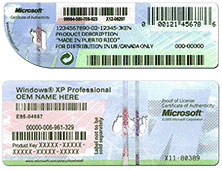Local Lincoln Company Sued by Microsoft
- Comments: 17
- Written on: June 23rd, 2010
 This morning an article ran in the Lincoln Journal Star newspaper stating that one of Schrock Innovations’ local competitors, QuickTEQ computers, is being sued by Microsoft for allegedly intentionally selling counterfeit Windows XP Professional products and improperly using Microsoft’s trade marks.
This morning an article ran in the Lincoln Journal Star newspaper stating that one of Schrock Innovations’ local competitors, QuickTEQ computers, is being sued by Microsoft for allegedly intentionally selling counterfeit Windows XP Professional products and improperly using Microsoft’s trade marks.
The basic outline of the story is that QuickTEQ sells a lot of refurbished laptops and Desktops. According to the article, Microsoft detected QuickTEQ was selling copies of the company’s Windows XP Professional operating system in ways that did not conform with the company’s licensing rules.
Microsoft warned QuickTEQ with a letter, and later sent an undercover investigator to follow up and see if QuickTEQ was still improperly selling Windows XP Professional.
After the investigator returned his findings, Microsoft hired Omaha attorney Richard Jeffries to file a suit against QuickTEQ.
Exactly What Did QuickTEQ do Wrong?
That is hard to say at this point. Microsoft’s licensing rules are complex in refurbished computer situations. QuickTEQ sells refurbished computers that were sold coming off leases, at auctions, or in other situations when companies and government entities are done using them.
As a rule, when a computer is purchased and it has a copy of Windows pre-installed on it, that software is licensed under certain conditions. For example:
- You can’t remove the hologram sticker and reapply it to another computer owned by someone else
- You can’t transfer ownership of the Windows Operating system without the manuals and the original hologram CD or recovery media
- You can not resell an Enterprise installation of Windows (big business copy) to a home user
The article doesn’t say exactly what QuickTEQ is accused of doing wrong, but I was personally really surprised to hear about Microsoft filing this suit.
QuickTEQ Was Reportedly Trying to Be Careful
I had herad through the grapevine that QuickTEQ had received a letter from Microsoft about licensing. My understanding from my sources was that the company was taking the letter very seriously.
I spoke to a couple former QuickTEQ employees this morning and they reported that as employees they were aware the company received a letter from Microsoft and that QuickTEQ was “trying to be careful.”
What is Going to Happen Now?
In these situations, Microsoft is likely to ask for a temporary or permanent injunction against QuickTEQ to prevent them from selling any additional licenses.
According to the Journal Star, Microsoft is seeking information that will allow them to identify their exact monetary loss in the situation. I am not certian if that means they want a tally of the number of licenses sold, or they want the information about who bought the licenses.
Generally, Microsoft does not go after individual consumers for buying counterfeit software. They prefer to go after the players who they believe are putting the counterfeit software in the market for others to buy.
With that said, QuickTEQ has not told their side of the story yet. They did not comment to the Journal Star, and are probably just learning about the suit as well. QuickTEQ and its owner, Kevin Knudsen, are honorable staples in the Lincoln business community and I personally believe there is some misunderstanding here that will eventually be settled out of court.
How Can I Tell if My Software is Genuine?
Microsoft maintains a website that helps users determine if the Windows Software on their computer is genuine. Here are a few of the key things from that website to look for so you can put your mind at ease. Signs your Microsoft software may not be genuine:
- You did not receive any documentation or manual with your software
- Your computer does not have a holographic Windows sticker applied to its case
- You did not receive a hologram disc or recovery media with your computer
- Was the software properly licensed (home user buying Enterprise license for example)
